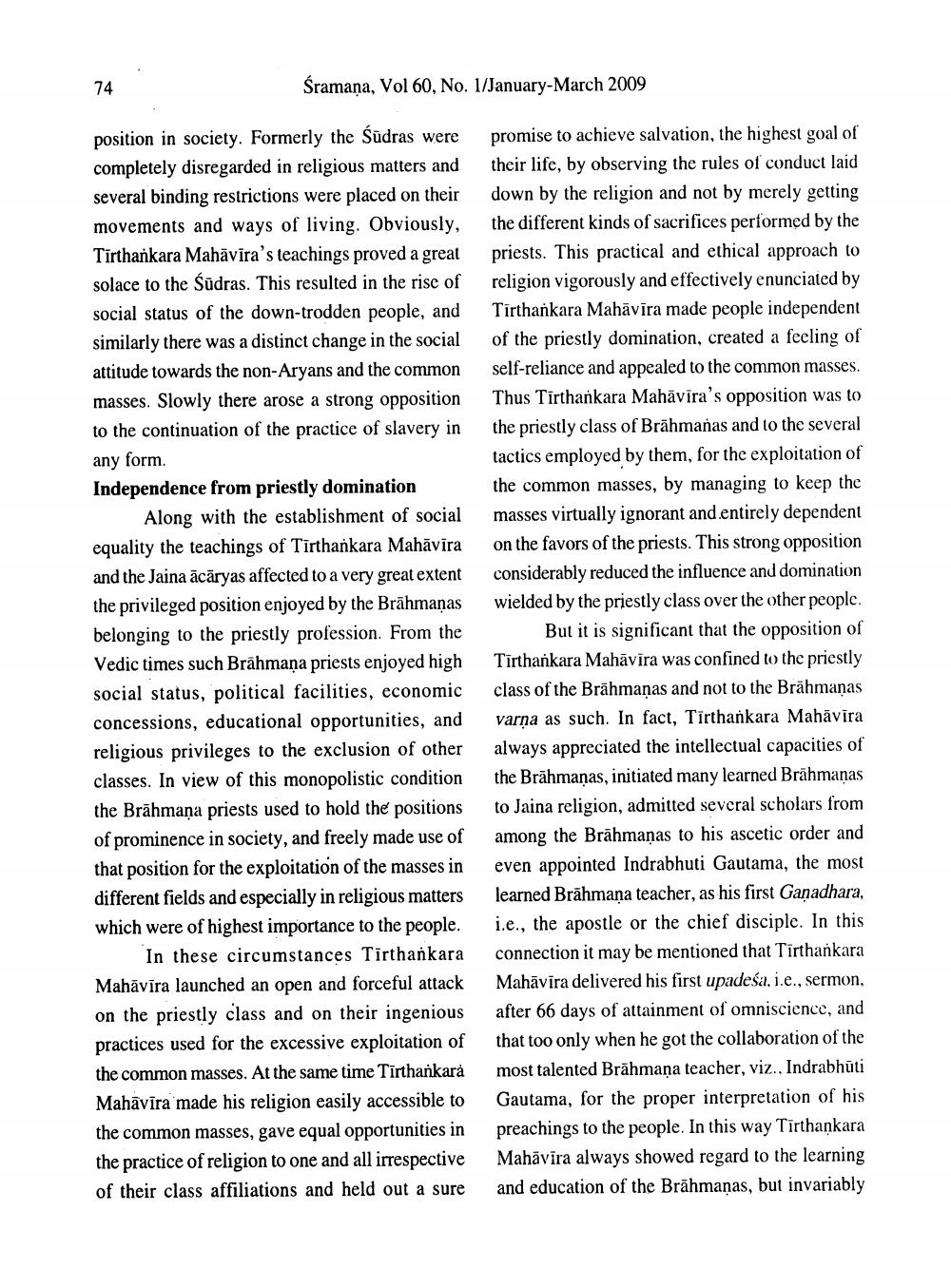________________
74
Śramaņa, Vol 60, No. 1/January-March 2009
position in society. Formerly the Sūdras were completely disregarded in religious matters and several binding restrictions were placed on their movements and ways of living. Obviously, Tīrthankara Mahāvīra's teachings proved a great solace to the Sūdras. This resulted in the rise of social status of the down-trodden people, and similarly there was a distinct change in the social attitude towards the non-Aryans and the common masses. Slowly there arose a strong opposition to the continuation of the practice of slavery in any form. Independence from priestly domination
Along with the establishment of social equality the teachings of Tīrthankara Mahāvīra and the Jaina ācāryas affected to a very great extent the privileged position enjoyed by the Brāhmaṇas belonging to the priestly profession. From the Vedic times such Brāhmaṇa priests enjoyed high social status, political facilities, economic concessions, educational opportunities, and religious privileges to the exclusion of other classes. In view of this monopolistic condition the Brāhmaṇa priests used to hold the positions of prominence in society, and freely made use of that position for the exploitation of the masses in different fields and especially in religious matters which were of highest importance to the people.
In these circumstances Tirthankara Mahāvīra launched an open and forceful attack on the priestly class and on their ingenious practices used for the excessive exploitation of the common masses. At the same time Tīrthankarà Mahāvīra made his religion easily accessible to the common masses, gave equal opportunities in the practice of religion to one and all irrespective of their class affiliations and held out a sure
promise to achieve salvation, the highest goal of their life, by observing the rules of conduct laid down by the religion and not by merely getting the different kinds of sacrifices performed by the priests. This practical and ethical approach to religion vigorously and effectively enunciated by Tirthankara Mahāvīra made people independent of the priestly domination, created a feeling of self-reliance and appealed to the common masses. Thus Tirthankara Mahāvīra's opposition was to the priestly class of Brāhmanas and to the several tactics employed by them, for the exploitation of the common masses, by managing to keep the masses virtually ignorant and entirely dependent on the favors of the priests. This strong opposition considerably reduced the influence and domination wielded by the priestly class over the other people.
But it is significant that the opposition of Tīrthankara Mahāvīra was confined to the priestly class of the Brāhmaṇas and not to the Brāhmaṇas varņa as such. In fact, Tīrthankara Mahāvīra always appreciated the intellectual capacities of the Brāhmaṇas, initiated many learned Brāhmaṇas to Jaina religion, admitted several scholars from among the Brāhmaṇas to his ascetic order and even appointed Indrabhuti Gautama, the most learned Brāhmaṇa teacher, as his first Ganadhara, i.e., the apostle or the chief disciple. In this connection it may be mentioned that Tirthankara Mahāvīra delivered his first upadeśa. i.e., sermon, after 66 days of attainment of omniscience, and that too only when he got the collaboration of the most talented Brāhmaṇa teacher, viz., Indrabhūti Gautama, for the proper interpretation of his preachings to the people. In this way Tirthankara Mahāvīra always showed regard to the learning and education of the Brāhmaṇas, but invariably




